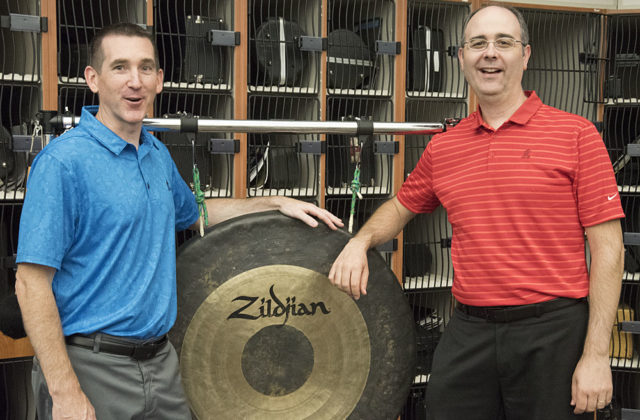At Northwestern Regional High School, the Band’s All Here
By Ruth Melville
In music education circles, the music program at Northwestern Regional High School has long been acknowledged to be one of the finest in the state, if not the region. Three times, in 2000, 2006 and 2015, the Northwestern high school band has been chosen the top ensemble at the Connecticut Music Educators Convention—the highest award in the state. This success is particularly noteworthy when you consider that Northwestern is regularly coming out on top of bigger and richer schools.
For the past 18 years the high school music program has been under the direction of Steve Zimmerman, who also teaches classes in guitar and in music history and theory, and conducts the two high school bands. When he first came to the school there was only one band, but when the number of students grew too big to fit into one room, the band was broken up into two ensembles.
The music curriculum at Northwestern Regional, from middle school through high school, is designed to be as seamless as possible. Zimmerman has high praise for Jim Lesieur, who directs the middle school band and, along with choral director Dylan Pedersen, teaches the general music program for the middle school.
Lesieur came to the Northwestern the same year as Zimmerman, and they have worked well has a team over the years. Zimmerman says that Lesieur “ignites the flame for kids to play a lot” and cites as a measure of his success the fact that 90 percent of 8th grade band members sign up for 9th grade band. As Zimmerman puts it, Lesieur “gets them enthusiastic enough that they want to continue playing in high school.”
Emma Klimkosky, a sophomore who plays clarinet in the band and at the all-state level, agrees. “The reason why the high school band is so good is because we get such a good foundation in music from Mr. Lesieur and Mr. Zimmerman.”
In turn, Zimmerman and Lesieur applaud the music teachers at Botelle School: Liz Allyn, who teaches basic music, chorus, and stringed instruments, and Ashley Bianchi, who directs the band. Zimmerman says that “the foundation for all music making comes in those early years,” and calls the Botelle program “a true model of elementary music education.”
A hundred and twenty-five students, about 15 to 20 percent of the high school, take part in the music program. This is a much higher rate of participation than the state average of 6 percent. The administration and faculty, Zimmerman says, have been amazingly supportive of the band. It’s not easy to schedule classes and facilities for the number of students involved.
The two performing ensembles are ranked, but placement into the upper and lower ensemble is not determined purely by audition. Freshmen, with rare exceptions, are put into the lower ensemble; almost all seniors into the top one. Sophomores and juniors audition for their places. This mixed system is not typical, but came about as a result of discussions among students, parents and administrators. Zimmerman says it was about finding a way “to fit the band into the community we want to create.”

Jim Lesieur, left, directs the middle school band at NW Regional 7, while Steve Zimmerman, who also teaches music history and theory, leads the two high school bands.
Concert performances are scheduled about every six weeks. For the top ensemble, there is a spring concert in May, a fall concert in October and a winter one in December. Everyone plays in the pep band, which performs at basketball games. The band also plays at graduation and at local parades—in Norfolk and Winsted on Memorial Day and at the Bristol Mum parade in September. The Bristol parade is a competition for about 10 bands, and Northwestern has always been ranked in the top two, although Zimmerman notes that his goal is not to win but “to be the most entertaining and the most musical band.”
Every spring there is a senior recital, which in 2015 was held at the Yale Music Shed. The music for the recital is chosen and produced by the students themselves. Zimmerman says that it is “a big step forward in independence for the students.” All the pieces are chamber music, from solos up to quintets.
An indication of the high quality of the Northwestern program is the individual success of many of the musicians. Students have performed in county, regional, state, New England and national ensembles, and several have been chosen as principals. Recent graduates Sarah Allyn and Maggie Dahill were the principal trumpet and bassoon, respectively, in the All New England Orchestra, and Talia Michaud was the third player in the past 10 years to win placement in a national ensemble. A little over half of the band members go on to play in college.
Zimmerman, too, has been honored by the profession. In 2012, the Connecticut Music Educators Association chose him as one of its Educators of the Year, and in 2013 he won a Yale Distinguished Music Educator Award. The students dedicated the yearbook to him in 2014 and chose him to be the graduation speaker.
But Zimmerman says he “doesn’t like to talk about accolades.” He is much more concerned that the students come away with a joy of playing and the ability to do it on their own. He’s clearly pleased that students get together to play out of school hours. “There’s no award for that or for making students passionate about music.”
Photographs by Bruce Frisch.


A wonderful article! I love hearing about their success. I was in the high school band the year they began teaching at Regional 7. They were a breath of fresh air to the program then and I’m thrilled to hear that they continue to expand to do great things inspiring kids with music.